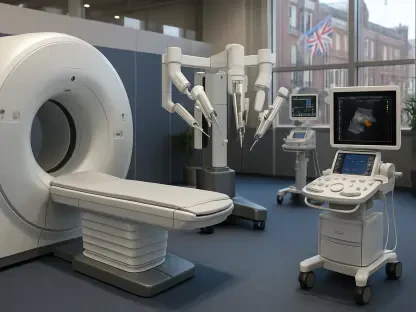The healthcare industry is undergoing a profound transformation, driven by a new generation of MedTech startups that are leveraging cutting-edge technologies to tackle some of the most persistent challenges in medical care. These innovative companies are not only introducing groundbreaking tools but also reshaping the very framework of how healthcare is delivered, making it more personalized, accessible, and efficient. By harnessing artificial intelligence (AI), wearable devices, and non-invasive therapies, startups like Nutromics, Midi Health, Grey Matter Neurosciences, Puzzle Medical Devices, and Hinge Health are leading the charge in redefining diagnostics, treatment, and patient outcomes. Their efforts focus on critical areas such as early detection, cost reduction, and decreasing reliance on traditional hospital settings. This exploration delves into the pioneering work of these companies, highlighting the trends they embody and the tangible impact they are having on the medical landscape. As their solutions gain traction, the potential for a more connected and patient-focused healthcare system becomes increasingly clear, setting the stage for significant advancements in the years ahead.
Driving Forces Behind MedTech Innovation
The surge of innovation in the MedTech sector is fueled by a commitment to patient-centric care, where technology is tailored to meet individual needs with precision and empathy. A defining trend is the use of data-driven approaches, enabled by AI and wearable sensors, to provide real-time health insights. This shift allows for proactive interventions rather than reactive treatments, empowering patients to manage their well-being with greater autonomy. For many underserved populations, such as women navigating midlife health challenges or individuals with chronic conditions, this personalized focus is bridging long-standing gaps in access and care quality. The emphasis on customization is not merely a technological advancement but a fundamental rethinking of how healthcare systems can prioritize the unique circumstances of each patient, ensuring that solutions are both relevant and effective in diverse contexts.
Another pivotal force in MedTech innovation is the push toward non-invasive and minimally invasive technologies that enhance patient comfort while maintaining high standards of care. By developing tools like wearable diagnostic devices and ultrasound-based therapies, startups are reducing the need for risky surgeries or prolonged hospital stays. This approach not only accelerates recovery times but also aligns with a broader industry goal of cutting healthcare costs, making advanced treatments more affordable and scalable. The integration of such technologies reflects a growing recognition that effective care does not have to be intrusive or expensive. Instead, these advancements demonstrate how innovation can simplify medical processes, minimize physical and financial burdens on patients, and still deliver outcomes that rival traditional methods, thereby transforming expectations around medical interventions.
Pioneering Startups Redefining Medical Care
Among the standout innovators, Nutromics is making waves with its “lab-on-a-patch” wearable technology, which continuously monitors vital health markers without the need for invasive blood tests. This Australian-based startup offers real-time alerts for life-threatening conditions such as heart attacks or sepsis, enabling early intervention that can save lives and reduce healthcare burdens. Unlike traditional diagnostics that often require lab visits and delayed results, this solution prioritizes immediacy and convenience, allowing patients and providers to act swiftly when critical issues arise. The impact of such technology extends beyond individual care, as it has the potential to alleviate strain on medical facilities by catching problems before they escalate into emergencies, thus redefining the landscape of preventive healthcare with a focus on accessibility and speed.
Equally transformative is Midi Health, a startup dedicated to addressing the often-overlooked needs of women during midlife and menopause through an AI-powered virtual platform. By offering personalized care plans, symptom tracking, and preventive strategies via telemedicine, Midi Health ensures that women have access to tailored support without the barriers of in-person visits. This focus on accessibility is particularly vital for those in remote or underserved areas, where specialized care is scarce. Beyond just treatment, the platform emphasizes education and empowerment, equipping women with the tools to manage their health proactively. The integration of digital tools to address a demographic historically underserved by mainstream healthcare highlights how targeted innovation can close critical gaps, setting a precedent for other areas of medicine to follow suit with similar dedication to specific patient groups.
Breakthrough Solutions in Specialized Fields
Grey Matter Neurosciences is carving a niche in neurological care with its non-invasive focused-ultrasound neuromodulation technology, targeting disorders like Alzheimer’s and Parkinson’s. By using ultrasound waves to stimulate specific brain regions, this approach aims to improve cognitive function and slow disease progression without the risks associated with surgery or heavy medication use. The potential to offer patients an alternative that prioritizes safety and efficacy is a game-changer for those grappling with debilitating conditions. This technology underscores a shift toward treatments that respect the body’s natural boundaries while still achieving significant therapeutic outcomes, providing hope for millions who previously faced limited options. As such, it represents a bold step forward in how complex neurological challenges are addressed within the broader healthcare ecosystem.
In the realm of cardiac care, Puzzle Medical Devices is innovating with minimally invasive transcatheter pumps designed for chronic heart failure patients. These implantable devices enhance cardiac output, improving quality of life and reducing the frequency of hospital readmissions. By tackling the high costs and logistical challenges associated with heart failure management, this solution offers a lifeline to patients who often face repeated interventions and prolonged medical oversight. The emphasis on long-term, sustainable care reflects a deeper understanding of the chronic nature of such conditions, ensuring that patients can maintain independence without sacrificing health outcomes. This startup’s contribution illustrates how specialized MedTech can address some of the most pressing and costly issues in healthcare, paving the way for more efficient and compassionate treatment models.
Holistic Approaches and Future Impact
Hinge Health is redefining musculoskeletal care by blending wearable sensors, virtual physical therapy, and AI-driven coaching into a comprehensive home-based program. Patients can engage in tailored exercises with real-time feedback, significantly reducing the need for in-person sessions or invasive procedures like surgery. What sets this startup apart is its integration of mental health support, recognizing the critical link between physical recovery and emotional well-being. This holistic approach ensures that care extends beyond mere symptom management to encompass the broader aspects of a patient’s life, fostering resilience and long-term health. By making therapy accessible from the comfort of home, Hinge Health is not only improving outcomes but also setting a new standard for how chronic pain and mobility issues are managed in a digital age.
Looking back, the strides made by these MedTech startups showcase a remarkable era of innovation that has fundamentally altered healthcare delivery. Their focus on personalized, non-invasive, and accessible solutions tackles systemic challenges head-on, from escalating costs to unequal access. Moving forward, the industry must continue to support such pioneers by fostering environments where technology and patient needs intersect seamlessly. Policymakers and healthcare providers should consider integrating these advancements into mainstream systems, ensuring scalability and affordability. Additionally, ongoing investment in research and collaboration will be crucial to sustain this momentum, addressing emerging health threats with the same ingenuity. The legacy of these companies serves as a blueprint for future progress, urging stakeholders to prioritize innovation that empowers patients and transforms lives on a global scale.









